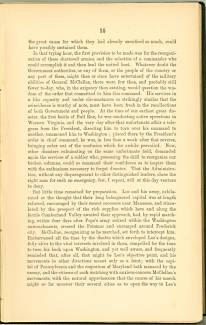Collection Name
About
the great cause for which they had already sacrificed so much, could have possibly sustained them.
In that trying hour, the first provision to be made was for the reorganization of these shattered armies, and the selection of a commander who could accomplish it and then lead the united host. Whatever doubt the Government authorities, or any of them, or the people of the country or any part of them, might then or since have entertained of the military abilities of General McClellan, there were few then, and probably still fewer to-day, who, in the exigency then existing, would question the wisdom of the order that committed to him this command. His services in a like capacity and under circumstances so strikingly similar that the coincidence is worthy of note, must have been fresh in the recollections of both Government and people. At the time of our earliest great disaster, the first battle of Bull Run, he was conducting active operations in Western Virginia, and the very day after that unfortunate affair a telegram from the President, directing him to turn over his command to another, summoned him to Washington ; placed there by the President's order in chief command, he was, in less than a week after that reverse, bringing order out of the confusion which for awhile prevailed. Now, other disasters culminating on the same unfortunate field, demanded again the services of a soldier who, possessing the skill to reorganize our broken columns, could so command their confidence as to inspire them with the enthusiasm necessary to forget disaster. That the Administration, without any disparagement to other distinguished leaders, chose the right man for such an emergency, few, I repeat, will at this day venture to deny.
But little time remained for preparation. Lee and his army, exhilarated at the thought that their long beleaguered capital was at length relieved, encouraged by their recent successes near Manassas, and stimulated by the prospect of the rich supplies which here and along the fertile Cumberland Valley awaited their approach, had, by rapid marching, within four days after Pope's army retired within the Washington entrenchments, crossed the Potomac and encamped around Frederick city. McClellan, reorganizing as he marched, set forth to intercept him. Embarrassed all the time by the doubts which enveloped Lee's designs, fully alive to the vital interests involved in them, compelled for the time to turn his back upon Washington, and yet well aware, and frequently reminded that, after all, that might be Lee's objective point, and his movements in other directions meant only as a feint; with the capital of Pennsylvania and the emporium of Maryland both menaced by the enemy, and the citizens of each watching with anxious concern McClellan's movements, with the natural apprehension that the course of his march might so far uncover their several cities as to open the way to Lee's
